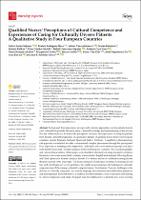Please use this identifier to cite or link to this item:
https://repositorio.usj.es/handle/123456789/961
| Title: | Qualified Nurses' Perceptions of Cultural Competence and Experiences of Caring for Culturally Diverse Patients: A Qualitative Study in Four European Countries |
| Authors: | Antón-Solanas, Isabel



Rodriguez-Roca, Beatriz 
Vanceulebroeck, V. 

Komurcu, Nuran 
Kalkan, Idrani 


Tambo Lizalbe, Elena 

Huércanos-Esparza, Isabel 

Casa-Nova, Antonio 


Hamam-Alcober, Nadia 
Coelho, Margarida 


Coelho, Teresa 
Van Gils, Yannic 
Değirmenci Öz, Seda 

Kavala, Arzu 

Subiron-Valera, Ana Belen 

|
| Keywords: | Cultural competence; Cultural diversity; Europe; Health equity; Health services; Multiculturalism; Nurses; Nursing; Qualitative research |
| Issue Date: | 5-May-2022 |
| Publisher: | MDPI |
| Citation: | Antón-Solanas, I.; Rodríguez-Roca, B.; Vanceulebroeck, V.; Kömürcü, N.; Kalkan, I.; Tambo-Lizalde, E.; Huércanos-Esparza, I.; Casa Nova, A.; Hamam-Alcober, N.; Coelho, M.; et al. Qualified Nurses’ Perceptions of Cultural Competence and Experiences of Caring for Culturally Diverse Patients: A Qualitative Study in Four European Countries. Nurs. Rep. 2022, 12, 348–364. https:// doi.org/10.3390/nursrep12020034 |
| Abstract: | Background: European nurses are expected to provide appropriate care for patients from diverse cultural backgrounds. However, there is limited knowledge and understanding of this process. The aim of this study was to analyse the perceptions of culture and experiences of caring for patients from diverse cultural backgrounds of a purposive sample of qualified nurses from four European countries, namely Belgium, Portugal, Spain and Turkey. Methods: A qualitative phenomenological approach was selected in order to understand complex phenomena through the participants’ lived experiences, meanings and perspectives. Individual interviews and focus groups took place with 28 staff nurses and 11 nurse managers from four European countries. The sociodemographic and cultural characteristics of the sample were described and analysed using descriptive statistics. Qualitative data were transcribed verbatim, translated into English and analysed following Braun and Clark’s phases for thematic analysis. Results: Five themes and twelve subthemes emerged from thematic analysis of the transcripts. The themes included: (1) relevance of culture for nursing; (2) culture in the healthcare service; (3) qualities of the healthcare professionals; (4) challenges to culturally competent care; (5) becoming a culturally competent nurse. Conclusions: There are challenges to the delivery of culturally congruent care, namely language and communication difficulties, prejudices and stereotyping in the health service, a tendency for ethnocentrism, a lack of education and training in cultural competence and a lack of support from the health service to facilitate new ways of acting. |
| URI: | https://repositorio.usj.es/handle/123456789/961 |
| ISSN: | 2039-4403 |
| Appears in Collections: | Artículos de revistas |
Files in This Item:
| File | Description | Size | Format | |
|---|---|---|---|---|
| Qualified Nurses' Perceptions of Cultural Competence and Experiences of Caring for Culturally Diverse Patients.pdf | 289,28 kB | Adobe PDF |  View/Open |
This item is licensed under a Creative Commons License

